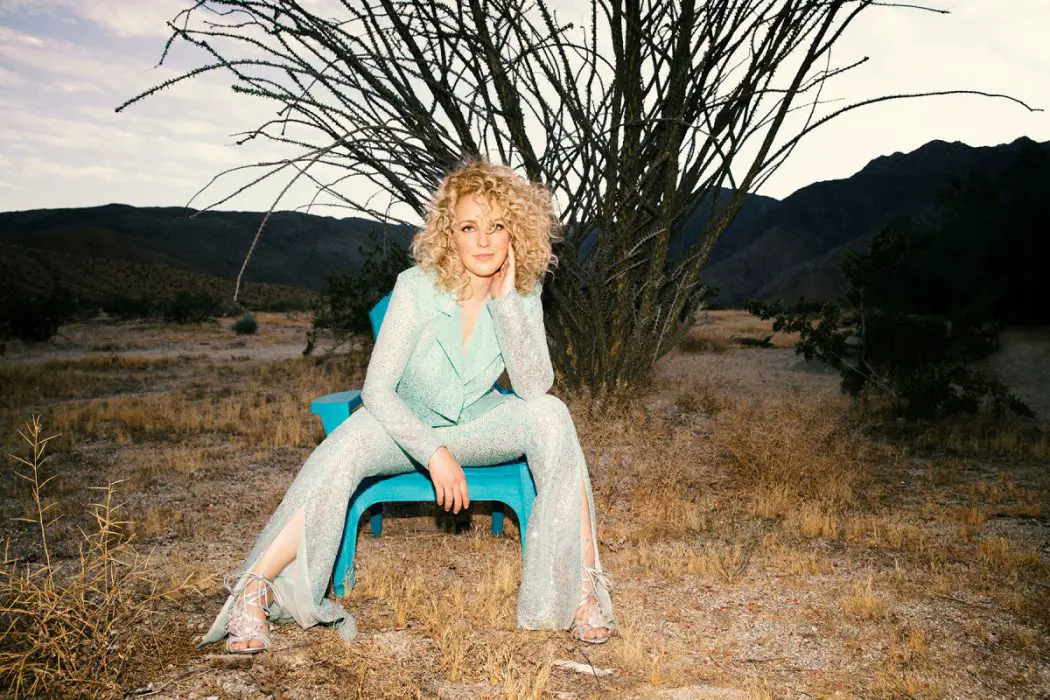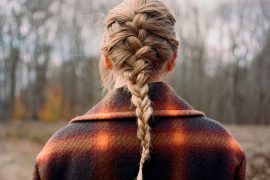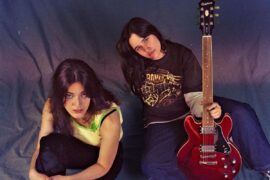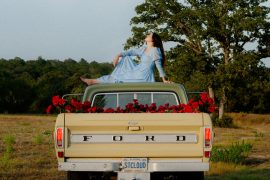An essay on country artist Cam’s “Diane,” off her latest album ‘The Other Side,’ in response to Dolly Parton’s “Jolene,” through a feminist lens.
Stream: “Diane” – Cam
“Jolene, Jolene, Jolene, Jolene, I’m begging of you please don’t take my man.”
We all know the song. We all know the singer. It’s the classic echo of a country music legacy, and when Dolly Parton released “Jolene” in 1973, it became one of her first hit singles.
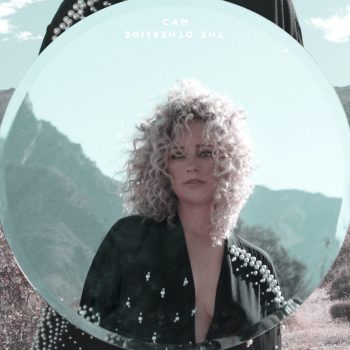
Today, the track is the most covered song in music history, as it stands recognizable from every corner of the world with a melody that’s unforgettable and a storyline about longing and desperation that’s become all too familiar for many. When it shot to the top of the charts, Parton’s career catapulted beyond country music parameters, and her life was never the same.
You know whose lives are also never left the same? Women whose husbands or “always loyal” partners cheat on them.
You’re probably thinking, that’s not what “Jolene,” is about. There’s another woman in this story who’s trying to take Jolene’s guy away from her, and yes, that’s what the song is about – until you hear Cam’s “Diane.”
The Grammy-nominated singer-songwriter, Cam (Camaron Ochs) burst onto the country music scene in 2015 with her hit single, “Burning House.” Following her massive mainstream success, she released her debut album Untamed in the same year. Shortly after, Cam released her song “Diane,” in 2017 and is now featured on her cathartic and eclectic new album, The Otherside.
The release of Cam’s The Otherside comes after five long years of music industry back-and-forths, a switching of record labels, becoming a mother, and multiple creative collaborations in between. Spanning across many genres, but staying true to her country roots, the new record shows off Cam’s effortless vocal ability and aptitude for storytelling. “Diane,” is a song that’s no exception to both of those things.
Stream: “Diane” – Cam
The Otherside’s release put “Diane” back on the radar for me and in a revisitation to women’s voices in country music, I thought it would be worthwhile to bring up the conversations that the song prompts.
For decades, music fans listen to “Jolene” and take Dolly Parton’s side of the story. You think, “Jolene is breaking this poor girl’s heart,” and you end up resenting her because of the narrative that Parton has painted for us, but what if, perhaps, Jolene had no way of knowing that man was already taken?
Diane,
I promise I didn’t know he was your man
I would have noticed a gold wedding band, Diane
I’d rather you hate me than not understand
One listen to “Diane,” and suddenly, Cam is spinning a story that’s been told since 1973 on its heels, by bringing to the modern-day music scene the question of, “What if it wasn’t ever the woman’s fault?” Regarding the song’s lyrics, she writes,
It’s my response to Dolly Parton’s ‘Jolene.’ It’s the apology so many spouses deserve, but never get. The other woman is coming forward to break the news to the wife about an affair, respecting her enough to have that hard conversation, once she realized he was married. Because everyone should be able to decide their own path in life, based on the truth. Women especially should do this for each other, since our self-worth can still be so wrapped up in our partners. And in true country fashion, I’ve set the whole raw story to upbeat music, so you can dance while you process it all.
For Dolly Parton, “Jolene” was written about a bank teller who had developed a “terrible crush” on her husband.
She told NPR, “He just loved going to the bank because she paid him so much attention. It was kinda like a running joke between us — when I was saying, ‘Hell, you’re spending a lot of time at the bank. I don’t believe we’ve got that kind of money.’ So it’s really an innocent song all around, but sounds like a dreadful one.” In addition, however, she also addresses in the song the very real, very insecure feeling that so many women face today against other women. “She had everything I didn’t, like legs — you know, she was about 6 feet tall,” Parton explained, “No matter how beautiful a woman might be, you’re always threatened by other women, period.” While that statement may not hold true for many women today, it did for many women back then. Perhaps this is where the character of “Jolene” becomes so integral to young women who related to the song in 1973 and the years after. Even today, the constant pitting of women against women still, unfortunately, hasn’t disappeared, but now, Cam’s “Diane” brings to light an important, new outlook.
“Diane” changes the way listeners will hear, “Jolene,” because suddenly, the story is no longer just about Jolene. It becomes about Jolene and Diane. It becomes about men who are to blame. It becomes about the selfishness of men who put women at odds against their own loyalty and sisterhood. If he doesn’t wear a ring, how is she to know that he’s taken? Sparkling gold on one’s left finger does not go unnoticed on any particular date night, no matter how dark the lighting in the bar or the restaurant or the club might be. The new story quickly becomes one about every woman who has ever been lied to or played by a man. It becomes about every woman who was ever forced to become Diane or Jolene.
While Parton’s tale is a classic that so many people love, for Cam, her song was a reflection of the sorrow, anguish, and regret of many real-life women she knew. “A good friend of mine, when she was about nine, her dad came home and said, ‘The secretary is pregnant and I’m leaving your mom,’” Cam explains. “That first Mother’s Day came around and her mom got them all dressed up and said, ‘We’re going to go over and wish them a Happy Mother’s Day because I’m not going to let you lose your relationship with your dad.” The story prompted me to write the song in response to a song like “Jolene,” and in an effort to highlight another woman’s heartache from her side of the story. “We have all these country songs about this,” Cam says, “but nobody wants to talk about it. It’s so much shame.”
https://www.instagram.com/p/BfJCTtlFuCd/?utm_source=ig_web_copy_link
The release of “Diane,” has opened up a dialogue that more women have been able to have with each other and with Cam, herself. From fans coming forward and letting her know, “This is my story. Thank you for telling it for me,” to more and more women picking up their phone and making that call like Diane did in the music video, a conversation has been started. “Diane,” is an apology. It’s an apology to Jolene underneath the fact that Diane has already accepted Jolene may never even forgive her, and yet, Diane isn’t even at fault. It’s not an apology for dating Jolene’s man. It’s regret, it’s shame, and it’s a heartbroken “I am sorry for us,” about how two women could fall for the same man’s lie.
And all those nights that he’s given to me,
I wish that I could give them back to you
Perhaps it’s fairer to acknowledge that in 1973, music listeners would have never batted an eye at the fact that another woman was trying to steal the man Jolene loved. Dolly Parton sang the song with conviction, heartache, and a longing that’s spanned over the course of several decades, but at the same time over the course of these several decades, women have been increasingly finding the courage to come forward in their own light, too.
Cam took a five-year break from releasing music after Untamed in 2015, but in the time since then, women in the country music genre have been on the rise, too. With a lack of female voices on mainstream country radio, artists like Maren Morris, Kacey Musgraves, and Brandi Carlile are still trying to spearhead a movement of trying to get fair radio play. The Highwomen released their self-titled album in 2019. Kacey Musgraves had won Album of The Year in an insane battle against pop music at the 61st Grammy Awards. Fans are still wondering if Carrie Underwood is truly the only option for women headliners at Stagecoach, while radio stations in 2020 can still be fined for playing two female voices back to back on the air.
Cam originally released “Diane,” as a single in 2017, but she put it on her latest album that was released three weeks ago. That was a choice she made because even within that short two-year period, how many women go to Nashville to start a career in country music only to be rejected because they aren’t “marketing material”? How many women go into a new relationship believing with their whole heart that they’re ready to give a new part of themselves to someone new again? How many women, because of the actions of men, end up becoming Diane or Jolene?
Too many.
I think what speaks volumes about Diane as a character is that she chose to make that phone call to his wife. She chose to explain from her side of the story how things had happened. She chose to offer a helping hand. Do you think any woman looking for a truthful, loving relationship for herself feels pride in finding out that she’s the other woman? She doesn’t. This isn’t to say all men are to blame and all women are innocent. Far from it, but regardless of gender in any relationship, if faithfulness is already in place, there wouldn’t have to be a wrong or right side. Yes, the character of Jolene is strong and faithful and loving, but Diane swallowed her pride and made that call knowing none of this was her fault.
While the man should have been the one taking responsibility for his actions, it still ends up being women who rise above to offer as much solace as they can to their sister they know is hurting just as much, if not more. It was still Diane who called. It was still Diane who felt that empathy. It didn’t matter to her if Jolene hated her for the rest of forever, she just wanted her to know the story from her side, and even after being lied to and used, it was still Diane who took Jolene’s side. Diane takes the woman’s side because while she may not have known he was married, the one thing she did know for sure was that she and Jolene were at fault for absolutely nothing except falling in love. This is the reality for so many women who navigate the dating world, their family life, and solely the search for unending love in a partner. How hard should that be to find?

“Diane” is a song I think everyone needs to hear, whether you like country music or not.
Everyone on this Earth knows who Dolly Parton is, and everyone knows who “Jolene,” is. I think it’s time they know who “Diane,” is too. It’s not meant to knock Parton off her pedestal because we need her there. Where would we be without a fearless kind of woman to lead country music the way she did? There may not be places for Cams or Marens or Kaceys or Kelseys or Brandis today without. “Diane,” is just a continuation of the story of women in the long line of country music songs about women already. “Diane” is just simply a new story, one that tells the pasts of many women today, and yet, published criticisms of the song in frustration of Cam giving the twist on the “Jolene” story still exist.
People don’t want to hear this changed narrative. Many traditional country music lovers don’t want to hear this conversation. They don’t want to hear “Jolene” in a new way. They want to keep it the way it feels to them, the way it has since 1973, and they think “Diane” sounds “too pop.” What’s quite funny is that all these criticisms have been written by men. It’s understandable to want to protect the memories of a song you have ties to from your earlier days, but if pushing country music written by men, about men, and for men, to the forefront of the genre is how you protect your audience’s comfort when women are telling stories like this, then who will protect the voice of women, if not women?
Cam isn’t invalidating “Jolene”; she’s just adding to its story – one that Dolly Parton began telling years ago because she too felt a similar pain, and if you don’t want to hear it, then you honestly don’t have to, 1) because country radio will probably never play it and 2) because it’s 2020 and you get to choose what you listen to.
If you want to use your choice for some good, I will say this: If you do care about what women have to say today in their music, about how they feel in their own expressions, about fair airplay for women in country music or even the music industry in general, then maybe, you could choose to give Cam’s The Otherside a stream or two, and help pave the way for an industry like ours to give Diane and Jolene a fair shot for once.
— —
Stream: “Diane” – Cam
— — — —
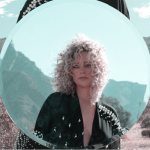
Connect to Cam on
Facebook, Twitter, Instagram
Discover new music on Atwood Magazine
? © Dennis Leupold
The Otherside
an album by Cam

